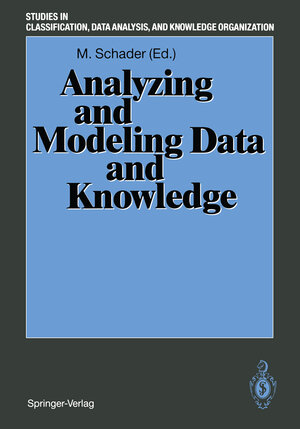
×
![Buchcover ISBN 9783642467578]()
Analyzing and Modeling Data and Knowledge
Proceedings of the 15th Annual Conference of the “Gesellschaft für Klassifikation e.V.“, University of Salzburg, February 25–27, 1991
herausgegeben von Martin SchaderInhaltsverzeichnis
- 1 Data Analysis, Classification.
- Parameter Extrapolation in Marketing Research.
- Application of Pattern Recognition and Fuzzy Sets to the Interpretation of Chromatograms.
- A Clustering Technique for Maximizing ø-Divergence, Noncentrality and Discriminating Power.
- Structural Analysis in Input-Output Tables.
- The Precision of Bayesian Single Case Classification.
- Bounds for the Tail Probabilities of the Linear Ratchet Scan Statistic.
- Multidimensional Scaling as a Framework for Correspondence Analysis and its Extensions.
- Conception of a Package for Typology Making and Analyzing.
- Exploratory-Graphical Methods for Time Series Analysis.
- Clustering in Metric Spaces: Some Existence and Continuity Results for k-Centers.
- Classification and Clustering in Spatial and Image Data.
- The MVL (Missing Values Linkage) Approach for Hierarchical Classification when Data are Incomplete.
- Formal Concept Analysis of Data With Tolerances.
- Towards a Structure Theory of Ordinal Data.
- The Jukes-Cantor Transformation and Additivity of Estimated Genetic Distances.
- 2 Data Modeling, Knowledge Processing.
- Decision Support for Retrieval From Fact Databases.
- Implementation of a Parallel Deductive Database.
- The WINHEDA Prototype: Knowledge-Based Access to Distributed Heterogeneous Knowledge Sources.
- Knowledge Representation in a System for Marketing Research.
- Data Management in a Knowledge-Based System for Marketing Research.
- Challenges for Information Systems: Representation, Modeling, and Metaknowledge.
- Enterprise Modeling: Basis for Information Systems Design.
- Massive Parallel Database Applications in Multiprocessor Systems.
- Improving Access to Legal Information in Document Databases Exploiting Techniques of Knowledge-Based Systems.
- 3 Applications, Special Subjects.
- Non-SpatialAnalysis of “Genetic Kinship” in Skeletal Remains.
- Some Common Problems in the Use of Classification Procedures in Social Science.
- Visualization in the Analysis Cycle of Observational Data.
- Stylistic Analyses in Archaeology by Means of Correspondence Analysis.
- Description and Classification of Respiratory Patterns with Multivariate Explorative Statistics.
- Structure and Phylogenetic Information of Large Subunit Ribosomal RNA.
- Hypermedia-Encyclopedias.
- The Multilayer Perceptron for Discriminant Analysis: Two Examples.
- RELATAN — Computer-aided Analysis of Texts based on the Method RELATEX.
- Phylogenetic Studies by Comparative Sequence Analysis of Evolutionary Conserved Macromolecules.
- Physical and Linguistic Facts.



